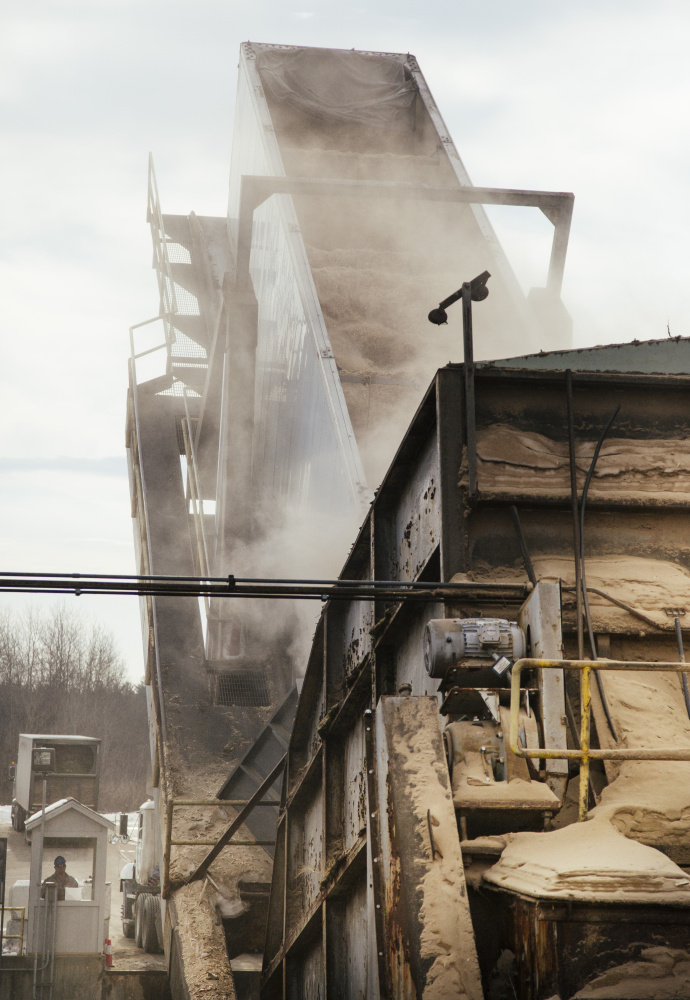AUGUSTA — A proposed law aimed at saving the state’s ailing biomass energy plants is filled with language about electricity contracts and the benefits of renewable power, but it’s really about jobs – and who stands to lose them or keep them.
Testimony on Monday before a legislative committee foreshadowed the challenge facing the Maine Legislature and Gov. Paul LePage in the weeks ahead, as they try to save a sector of the state’s forest products industry and hundreds of jobs without adding millions of dollars to electric bills.
A parade of truckers, loggers and contractors made a compelling case for the biomass plants.
Darryl Flagg has been hauling for the forest-products industry for 35 years. His company, D.R. Flagg & Son Trucking in Jefferson, has $2 million of equipment tied up in the work. But with the recent cascade of paper mill closings, he has come to rely on hauling wood fuel to the biomass plants. Now their future is in doubt, and so is the future of D.R. Flagg & Son.
“We’re losing our market,” he told the lawmakers on the Energy, Utilities and Technology Committee. “We’re losing our livelihood. This is serious. We’re going down.”
To save them, a proposed law would require the Public Utilities Commission to seek competitive bids and negotiate contracts for 80 megawatts of renewable energy for five years, under the latest terms of the proposal. That’s roughly enough power to supply nearly 76,000 homes. The PUC would aim to secure contracts for new or existing renewable energy resources likely to provide in-state economic benefits such as permanent jobs, local purchases of goods and services, and fuel diversity.
But opponents highlighted a major problem. The contracts are expected to come in at above-market rates. They could cost electricity customers millions of extra dollars each year. That might save some jobs, but it could eliminate others.
That message was conveyed to lawmakers by Jon Fitzgerald, general counsel at Bath Iron Works. The shipbuilder is one of the state’s top manufacturers and energy users. It competes for business with shipyards on the Gulf Coast that have cheaper energy costs. The last thing it needs is higher electric bills.
“Papermaking has suffered some serious blows,” Fitzgerald acknowledged. “Shipbuilding doesn’t want to join them.”
Biomass power plants use waste wood and low-grade forest products to generate roughly one-quarter of the state’s electricity. But they are inefficient and costly to operate, and recently, the combination of low oil and natural gas prices and the loss of renewable energy credits in Massachusetts has forced two plants owned by Covanta Energy to shut down. Four others, owned by ReEnergy Holdings LLC, are at risk of closure, if similar credits in Connecticut are phased out starting in 2018.
ReEnergy’s plants in Ashland and Fort Fairfield are currently struggling in northern Maine, a region already hammered by the loss of multiple pulp and paper mills over the past year. ReEnergy also operates plants in Livermore Falls and Stratton. The state also was hit by the shutdown of Covanta’s two Maine biomass plants this month, in West Enfield and Jonesboro.
The loss of the biomass market would be a huge blow to the logging industry, according to Dana Doran, executive director of the Professional Logging Contractors of Maine. Loggers have sold woody biomass waste from forestry operations to the plants for years. The shutdown of the two Covanta plants is already having a direct effect on a large percentage of Maine loggers, who are struggling with paper mill closures in 2015 and early 2016 that have already placed strains on the industry by limiting markets for wood fiber.
The logger group has estimated the total loss of the biomass industry in Maine would cost 400 direct jobs at the biomass plants and at least another 900 indirect jobs. Total economic losses to the state of Maine from the losses could be as high as $300 million per year, the group says.
“This bill is the last, best chance we have this legislative session to preserve this important industry,” Doran said. “Doing nothing means we may lose the biomass industry entirely, with consequences not only for hundreds of workers and their communities, but for the environment, forests and the future energy security of Maine.”
But subsidizing the biomass plants with ratepayer money could have a high price tag, depending on the contracts and wholesale energy prices in the near future.
Central Maine Power said the measure could add up to $48 million more to ratepayer bills. The utility also said that biomass plants have received more than $2.6 billion in ratepayer subsidies over the past 20 years, and despite that, half of them have closed since the 1990s because they weren’t competitive.
Tim Schneider, the state’s Public Advocate, said the proposal would increase costs for ratepayers without any corresponding benefit to them.
The proposal also was opposed by paper mills and industrial energy customers. It even drew criticism from the Natural Resources Council of Maine, which typically promotes renewable energy. But the environmental group said the plants are too inefficient and not clean-burning.
The scale of the request was questioned by LePage, who said the impact on ratepayers is too great. Through his energy director, Patrick Woodcock, LePage testified neither for nor against the bill. He said he wants to help the logging industry get a sustainable economic footing, but also has misgivings.
“This will likely increase the ratepayer impacts of the bill,” LePage said in a letter to the plant’s operators that served as a basis for the administration’s comments. “While I support the bill in concept, I am concerned about the scale of the legislation, and I further recommend ensuring that the facilities that receive this price certainty are investing in the facilities that lead to long-term economic viability.”
The bill is expected to be taken up again at a work session on Tuesday.
Send questions/comments to the editors.





Success. Please wait for the page to reload. If the page does not reload within 5 seconds, please refresh the page.
Enter your email and password to access comments.
Hi, to comment on stories you must . This profile is in addition to your subscription and website login.
Already have a commenting profile? .
Invalid username/password.
Please check your email to confirm and complete your registration.
Only subscribers are eligible to post comments. Please subscribe or login first for digital access. Here’s why.
Use the form below to reset your password. When you've submitted your account email, we will send an email with a reset code.